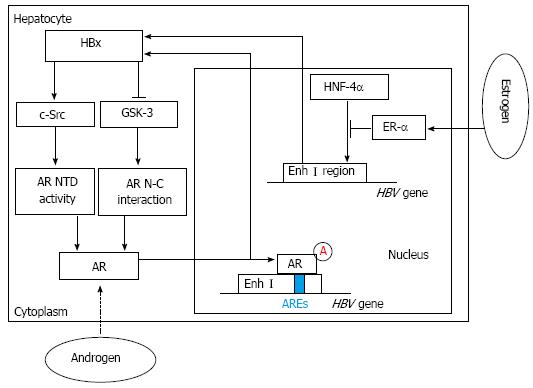Copyright
©2014 Baishideng Publishing Group Inc.
World J Gastroenterol. May 28, 2014; 20(20): 6252-6261
Published online May 28, 2014. doi: 10.3748/wjg.v20.i20.6252
Published online May 28, 2014. doi: 10.3748/wjg.v20.i20.6252
Figure 1 Hepatitis B virus X viral protein expression and sex hormone signaling pathways.
By activating c-Src and inactivating glycogen synthase kinase-3 (GSK-3), hepatitis B virus X viral protein (HBx) can enhance androgen receptor (AR) N-terminal transactivation domain (NTD) activity and AR N-C interaction, which contribute to full activation of AR. Then through binding directly to the cognate androgen-responsive element (ARE) in enhancer I (Enh I) of the hepatitis B virus (HBV) genome, androgen can cooperate with the androgen-signaling pathway to increase the transcription and replication of HBV genes and HBx expression. In contrast, estrogen can cooperate with estrogen receptor-α (ER-α) to decrease HBV RNA transcription by suppressing the activity of the HBV Enh I through preventing hepatocyte nuclear factor 4α (HNF-4α) from binding to Enh I.
- Citation: Liu WC, Liu QY. Molecular mechanisms of gender disparity in hepatitis B virus-associated hepatocellular carcinoma. World J Gastroenterol 2014; 20(20): 6252-6261
- URL: https://www.wjgnet.com/1007-9327/full/v20/i20/6252.htm
- DOI: https://dx.doi.org/10.3748/wjg.v20.i20.6252









